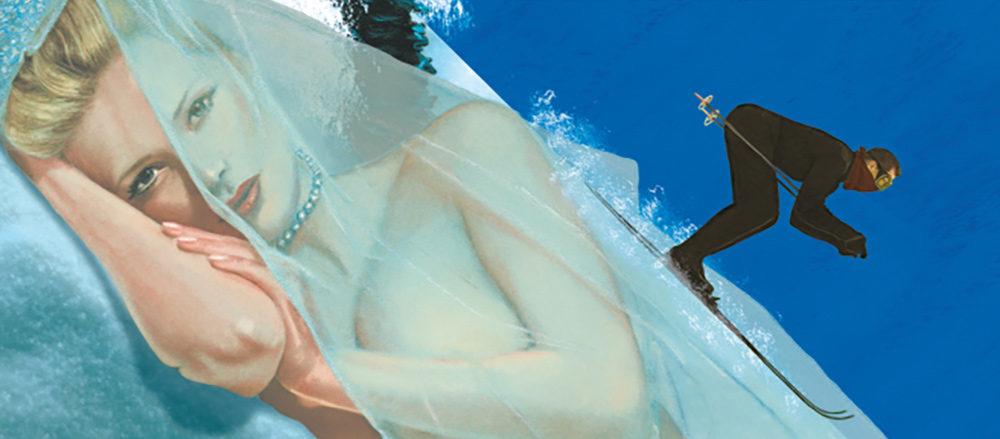

“Worry is a dividend paid to disaster before it is due.”
It has taken me quite a while to work up an appetite for another 007 novel after the travesty that is The Spy Who Loved Me. Truth be told, I’m not sure if it was worth it. On the one hand, On Her Majesty’s Secret Service is noteworthy because it contains what is undoubtedly Ian Fleming’s most human portrayal of James Bond. He’s introspective, considering retirement, and finds himself acting on an impulse to settle down and get hitched to the reckless and alluring Contessa Teresa di Vincenzo AKA Tracy AKA Mrs. Bond. But it’s also tainted (though not quite as bad as the previous volume) by Fleming’s weird rape fantasies and a whiff on re-using the villain from Thunderball.
Perhaps predicting the critical failure of the nearly Bond-less The Spy Who Loved Me, Fleming returns to his roots, so to speak. He kicks things off by sending Bond back to the Royale-les-Eaux, the setting of the first Bond novel and the resting place of the first Bond girl, Vesper Lynd. Actually, Fleming begins the story slightly ahead of this chronological starting point so that he can open with an exciting kidnapping scene. In any case, this initial section introduces us to a suicidal Tracy and her father, Marc-Ainge Draco, the head of a large European crime syndicate known as Unione Corse. Though Bond brushes off Draco’s request for him to become the man’s son-in-law, he makes use of the mob boss’s connections to further his current assignment: locating the whereabouts of Ernst Stavro Blofeld.
This quickly leads to Bond posing as a College of Arms representative and flying out to a mountaintop resort in Switzerland where the mysterious villain is carrying out scientific research on a number of nubile young women. Ostensibly curing them of livestock allergies through hypnosis, Blofeld is actually conditioning the ladies to carry biological weapons back to their homelands that will destroy the agricultural economy of Britain. All of the standard Bond elements are here—clandestine sneaking around the compound, suave conversation while drinking with the girls, midnight canoodling with one of the patients, blood-soaked ski chases, avalanches, bobsled pursuits. On one of the trips down the mountain Blofeld’s henchmen launch magnesium flares bound to parachutes to shed light on the nighttime chase. In many ways, it’s a satisfying Bond adventure.
However exciting the theatrics, Fleming’s plot here is needlessly complicated and unrewarding. Worse, he’s taken a strong villain and rendered him vainglorious and weak of will. In Thunderball, Blofeld was exceedingly patient, machinating in the shadows, waiting to show his hand until his plan was ready for execution. Indeed, MI6 didn’t even know that SPECTRE existed until the terrorist org stole two nuclear bombs. He’s ruthless and utilitarian and has remained elusive precisely because of his cautious nature. But the Blofeld of this book is different. Rather than careful and guarded, Blofeld is suddenly willing to risk his hard-earned anonymity in order to reclaim an old family title so that he can become a minor nobleman. But this doesn’t make any sense! Blofeld left his past behind to become a criminal mastermind. He worked himself ragged to wipe out records of his own existence. It doesn’t add up that he’s now trying to reclaim his family name for vanity’s sake. This critical change of character takes a menacing villain and renders him an egotistical fool.
And so at least we’ve got Tracy, right? Well, sort of. Bond trying to settle down and marry was new for the movies, but there have been several instances in the books—Gala Brand, Tiffany Case, Tatiana Romanova—where Bond found the idea of tying himself down appealing. But of course, Fleming couldn’t carry on with a Bond who was constantly worrying about remaining faithful to his wife, fussing over changes to his lifestyle, “nest-building,” and so on and so forth. So even though they actually do marry, Tracy is promptly shot in the head so that Bond can get on with his lonesome life. Without her untimely death, it’s hard to imagine that the newlyweds wouldn’t have parted ways by the next novel anyway. And because she exists mostly on the periphery of the story—far enough from the action that Bond does not hesitate to make the intimate acquaintance of one Ruby Windsor—there’s simply not enough of her for the reader to be moved by her death.
On Her Majesty’s Secret Service aspires to be greater than the typical Bond adventure, but the sentimentalizing and the weakened villain featured here pull us too far afield of the rollicking pace found in the best of them.